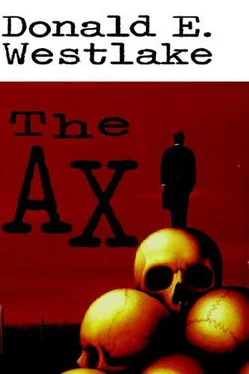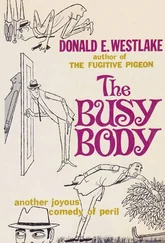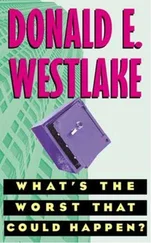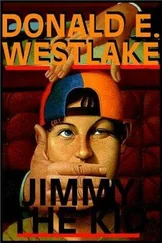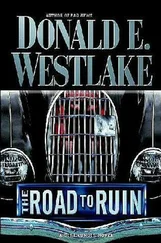Donald Westlake - The Ax
Здесь есть возможность читать онлайн «Donald Westlake - The Ax» весь текст электронной книги совершенно бесплатно (целиком полную версию без сокращений). В некоторых случаях можно слушать аудио, скачать через торрент в формате fb2 и присутствует краткое содержание. Год выпуска: 1997, ISBN: 1997, Издательство: Mysterious Press, Жанр: roman, на английском языке. Описание произведения, (предисловие) а так же отзывы посетителей доступны на портале библиотеки ЛибКат.
- Название:The Ax
- Автор:
- Издательство:Mysterious Press
- Жанр:
- Год:1997
- ISBN:9780892965878
- Рейтинг книги:5 / 5. Голосов: 1
-
Избранное:Добавить в избранное
- Отзывы:
-
Ваша оценка:
- 100
- 1
- 2
- 3
- 4
- 5
The Ax: краткое содержание, описание и аннотация
Предлагаем к чтению аннотацию, описание, краткое содержание или предисловие (зависит от того, что написал сам автор книги «The Ax»). Если вы не нашли необходимую информацию о книге — напишите в комментариях, мы постараемся отыскать её.
The Ax — читать онлайн бесплатно полную книгу (весь текст) целиком
Ниже представлен текст книги, разбитый по страницам. Система сохранения места последней прочитанной страницы, позволяет с удобством читать онлайн бесплатно книгу «The Ax», без необходимости каждый раз заново искать на чём Вы остановились. Поставьте закладку, и сможете в любой момент перейти на страницу, на которой закончили чтение.
Интервал:
Закладка:
What was he doing? What did he have in mind? Was he going to try to drive away from here, was he so rattled he never thought of the telephone? We stare at one another, and I shoot him in the face.
Much sloppier, this one, blood everywhere, face ruined, body a tangled unknotted mess on the garage floor, one arm flung backward through the open doorway into the house.
No one else at home? Daughters all at university? Or with their unacceptable lovers? How I hate them for making this confusion, driving that woman to mistake me for someone else, attack me, harangue me, discover the gun. Where's the neatness this time, the efficiency, the impersonality?
I'm shaking all over. I'm sweating, and I'm cold. I can barely hold on to the Luger, which I now put away in the inside pocket of my windbreaker, then trot along holding it in place with my left forearm.
I don't know if there's traffic, I don't know if a thousand people are watching me or no one. I only know there's the lawn, with that terrible dead sack on it, and there's the empty field, and there's the Plymouth Voyager.
I drive away, gripping the wheel hard because my hands are shaking. My whole body is shaking. I force myself to drive for ten minutes away from there, away from that neighborhood, staying within the speed limit, obeying all the traffic rules. Then at last I allow myself to pull off onto a dirt road and there, out of view, let the shaking have me. The shaking and the fear.
The sight of that woman's face. The memory of her running, and my hand holding up the gun, and then she falls. Her husband, goggle-eyed, made stupid by terror and grief.
This is horrible. Horrible. But what could I have done? From the instant she pulled away that raincoat, what could I have done differently?
What have I started here? What road am I on?
8
Once I knew what I had to do, after that sleepless and despairing night, I went back through the resumes three times more, and each time I was increasingly cold and critical and realistic. This person? Competition for me ? Education excellent, work record outstanding, but not in my field. A real find for some employer, but not for Arcadia Processing. Not for my job.
And so gradually I whittled the people down to six. Six resumes from people who, because of their work history and their education and their geographical location, were my true competition. I had to count location because I knew most employers would. They don't like to pay moving expenses unless they absolutely cannot find a qualified individual who already lives within commuting distance. So the bright stars in Indiana and Tennessee I decided not to worry about. Their competition was closer to home.
I realized from the beginning the irony in what I planned to do. These people, these six management experts, Herbert Coleman Everly and Edward George Ricks and the others, were not my enemy. Even Upton "Ralph" Fallon was not my enemy, I knew that. The enemy is the corporate bosses. The enemy is the stockholders.
These are all publicly held corporations, and it is the stockholders' drive for return on investment that pushes every one of them. Not the product, not the expertise, certainly not the reputation of the company. The stockholders care about nothing but return on investment, and that leads to their supporting executives who are formed in their image, men (and women, too, lately) who run companies they care nothing about, lead work forces whose human reality never enters their minds, make decisions not on the basis of what's good for the company or the staff or the product or (hah!) the customer, or even the greater good of the society, but only on the basis of stockholders' return on investment.
Democracy at its most base, supporting leaders only in return for their sating of greed. The ever-present nipple. That's why healthy companies, firmly in the black, lush in dividends to stockholders, nevertheless lay off workers in their thousands; to squeeze out just a little more, look just a little better for that thousand-mouthed beast out there that keeps the executives in power, with their million-dollar, ten-million-dollar, twenty-million-dollar compensation package.
Oh, I knew all that when I started, I knew who the enemy was. But what good does that do me? If I were to kill a thousand stockholders and get away with it clean, what would I gain? What's in it for me? If I were to kill seven chief executives, each of whom had ordered the firing of at least two thousand good workers in healthy industries, what would I get out of it?
Nothing.
What it comes down to is, the CEOs, and the stockholders who put them there, are the enemy, but they are not the problem. They are society's problem, but they are not my personal problem.
These six resumés. These are my personal problem.
9
The murders of the Rickses make the TV news, of course, being so much more dramatic than the death of Herbert Everly. Nine hours after I killed them, I sit in my living room with Marjorie, and we watch my crimes described by a solemnly excited blonde woman in a good green suit. Betsy and Billy are not with us. They never watch the news, not being interested in anything much beyond their immediate lives. At this moment, before dinner, I believe Betsy is on the phone, as she often is, and Billy is on the computer, as he usually is, while Marjorie and I watch my murders on the news, and Marjorie says, "Oh, Burke, that's horrible."
"Horrible," I agree.
It's strange, but someway or other I don't entirely recognize my actions from the blonde woman's recountal. The facts are essentially right; I did chase the wife across the lawn and shoot her there, and I did intercept the husband in the garage and shoot him there, and I did leave without a trace, without witnesses, without clues in my wake.
But somehow the tone is all wrong, the sense of it, the feeling of it. These words she uses—"brutal" "savage" "cold-hearted" — give completely the wrong impression. They leave out the error that caused it all. They leave out the panic and confusion. They leave out the trembling, the sweating, the icy fear.
But there's more to the story, all at once. They have a suspect! The police are questioning him, even now, at this very minute.
He's seen being led from an office building on a community college campus. He's a tweedy slope-shouldered middle-aged man with a gray widow's peak and large bifocals. He isn't handcuffed, but he's closely surrounded by beefy state troopers, one of whom puts his hand atop the suspect's head as he's urged into the backseat of a white state police car.
His name is Lewis Ringer, and he's a professor of literature at that community college. He is also the unacceptable lover of June Ricks, eighteen-year-old youngest child of the murdered couple. He is the man her mother thought I was, and I look more closely at that quick glimpse of him from building to police car, the second and third times they show it. I too wear large bifocals, and I too have a gray widow's peak, but other than that I don't see the similarity at all. Mrs. Ricks was a very stupid woman. I try not to think that she got what she deserved, but that thought does hover around the boundaries of my brain.
We also see the daughter, and what a piece of work she is. Not at all like our Betsy. June — or Junie, as her mother had called her when yelling mistakenly at me — is a sly, sullen, secretive girl, pretty in a foxlike way, full of sidelong glances and flickering smiles. Clearly, she's delighted to have caused such emotional upheaval in a man as to lead him to murder her parents, though just as clearly she can't admit to either the delight or the belief that in fact Ringer did it. The camera leaves her as fast as it decently can.
Читать дальшеИнтервал:
Закладка:
Похожие книги на «The Ax»
Представляем Вашему вниманию похожие книги на «The Ax» списком для выбора. Мы отобрали схожую по названию и смыслу литературу в надежде предоставить читателям больше вариантов отыскать новые, интересные, ещё непрочитанные произведения.
Обсуждение, отзывы о книге «The Ax» и просто собственные мнения читателей. Оставьте ваши комментарии, напишите, что Вы думаете о произведении, его смысле или главных героях. Укажите что конкретно понравилось, а что нет, и почему Вы так считаете.
